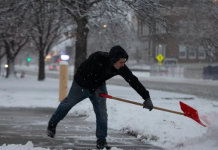The Interstate Crosscheck system, a controversial voter registration tracking program championed by former Kansas Secretary of State Kris Kobach, was labeled effectively “dead” after a legal agreement was announced Tuesday.
As part of the settlement in a lawsuit brought last year by the ACLU of Kansas, Kansas Secretary of State Scott Schwab agreed to complete a series of information safeguards and issue an “acknowledgement of error.”
The system had been on hold since 2017, when it was shut down by the U.S. Department of Homeland Security for data breaches. Lauren Bonds, the ACLU of Kansas’ legal director, said all the changes agreed to by Schwab will make Crosscheck a much different system.
“It’s safe to say, for all intents and purposes, at least from a security standpoint, the Crosscheck as we know it is no longer in existence and it’s dead,” Bonds said.
Because it lacked standard security requirements, Crosscheck exposed the personal information of nearly 1,000 Kansas voters, the lawsuit charged. The system was also criticized as inaccurate, and Kobach’s office acknowledged that it issued many “false positives.”
Heralded by Kobach as a way to find and prosecute voter fraud, Crosscheck once housed half of all U.S. voter registrations. It gained further national attention after Kobach lead President Donald Trump’s Presidential Advisory Commission on Election Integrity, which disbanded after roughly a year and failed to find any evidence of Kobach’s claims of widespread voter fraud.
Crosscheck was created in Kansas in 2005 as a way to keep voter rolls accurate by sharing information with nearby states. It was aimed at clearing rolls of doubled registrations, mostly because people moved from state to state without cancelling old data.
But critics said that in Kobach’s hands it was used to inappropriately target voters who made innocent mistakes and were criminally charged. It’s not illegal to be registered in two states. It is illegal to vote in two states, although studies suggest that’s very rare.
Schwab, who was unavailable for comment, issued this “acknowledgement of error”:
“The Kansas Secretary of State’s Office acknowledges your personal information was improperly disclosed through the Interstate Voter Registration Crosscheck Program. We recognize this led to an error in the use and handling of your information. Our office has adopted policies and procedures to ensure your voter information will be protected in the future.”
Anita Parsa, a Johnson County voter who doggedly investigated Crosscheck’s security problems, said she hopes the ACLU discloses the security upgrades. Parsa also said she hopes Schwab drops the program entirely, because it used simple two-point data matching that made results inaccurate.
“This is lipstick on a pig,” Parsa said of the settlement. “Even looking just at the data security aspect, it makes little sense for Kansans to pay to improve this program so we can keep offering it free to the other states when we could join a program that is already secure and no longer bear the full liability.”
Most states now belong to a Electronic Registration Information Center, run by Pew.
(Kansas News Service)
www.kcur.org




